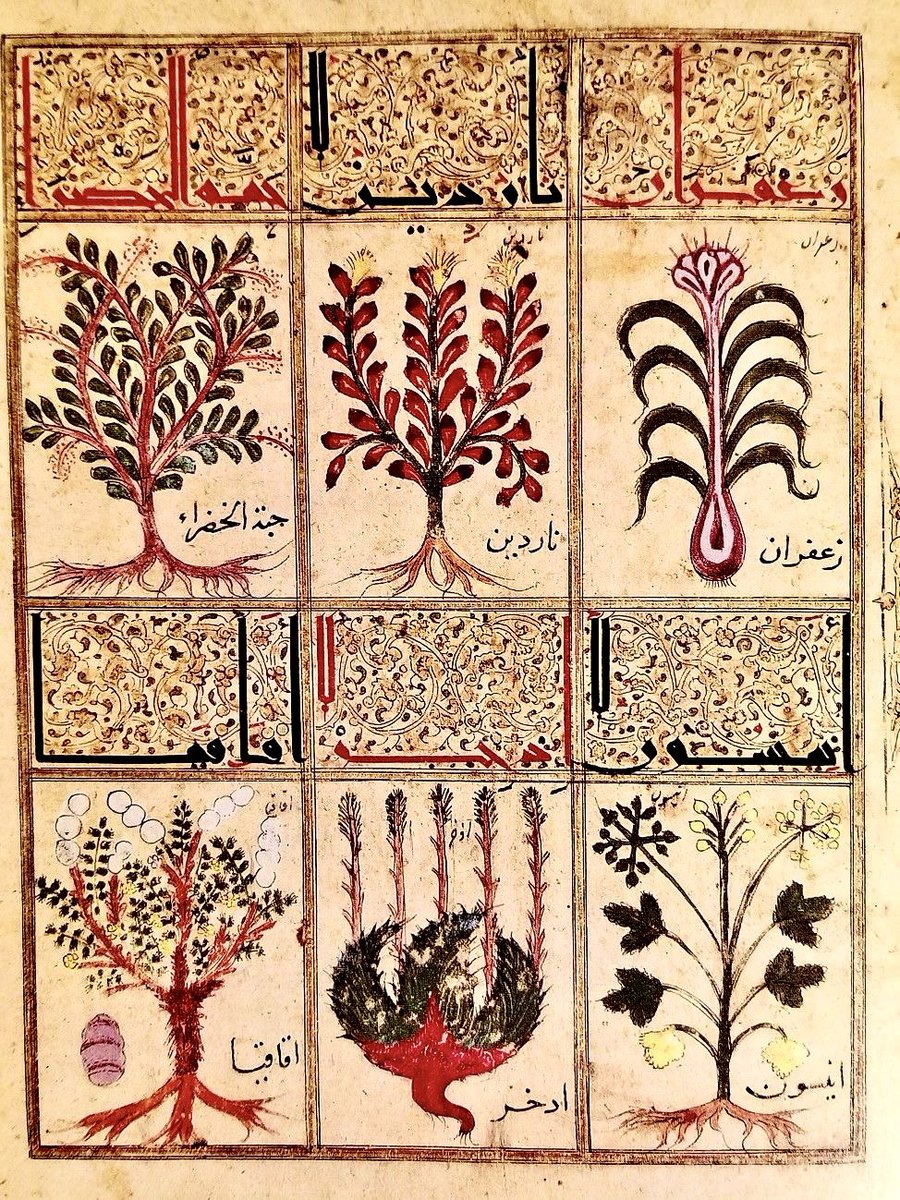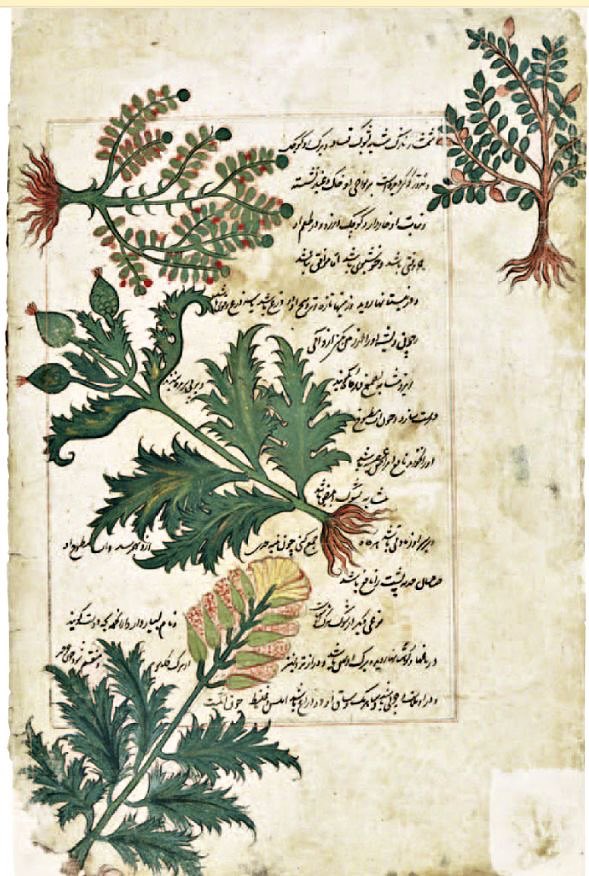
Ever wondered where ice cream came from? It is believed 2000 years ago in Persia, Arabs who conquered the Persian Empire enriched the recipe of snow chilled honey with milk & sugar #IceCreamDay
For #WorldIceCreamDay here are 25 frozen treats from Muslim cultures…
A thread…
For #WorldIceCreamDay here are 25 frozen treats from Muslim cultures…
A thread…

1/ Es Doger, Indonesia
Made of shaved ice, coconut milk, coco pandan syrup, fermented sticky rice & fermented cassava. It is popular in Bandung, West Java & comes from Cirebon. Its name is derived from ‘es dorong gerobak’, which translates as ‘carousel-pushed ice.’#IceCreamDay
Made of shaved ice, coconut milk, coco pandan syrup, fermented sticky rice & fermented cassava. It is popular in Bandung, West Java & comes from Cirebon. Its name is derived from ‘es dorong gerobak’, which translates as ‘carousel-pushed ice.’#IceCreamDay

2/ Dondurma Ice Cream, Turkey
Dondurma is a Turkish mastic ice cream, typically including the ingredients cream, whipped cream, salep, mastic, and sugar. It is believed to originate from the city and region of Maraş and hence also known as Maraş ice cream #IceCreamDay
Dondurma is a Turkish mastic ice cream, typically including the ingredients cream, whipped cream, salep, mastic, and sugar. It is believed to originate from the city and region of Maraş and hence also known as Maraş ice cream #IceCreamDay

3/ Faloodeh, Iran
A traditional Iranian cold dessert similar to a sorbet. It consists of thin vermicelli-sized noodles made from starch in a semi-frozen syrup containing sugar and rose water. Faloodeh is often served with lime juice and sometimes ground pistachios #IceCreamDay
A traditional Iranian cold dessert similar to a sorbet. It consists of thin vermicelli-sized noodles made from starch in a semi-frozen syrup containing sugar and rose water. Faloodeh is often served with lime juice and sometimes ground pistachios #IceCreamDay

4/ Potong Ice Cream, Malaysia
Potong means “cut” in Malay, referring to rectangular popsicles that are cut into portions from a bigger block. Made of coconut milk, skimmed milk, corn starch & sugar, & fused with flavours such as yam, durian & red bean (pictured) #IceCreamDay
Potong means “cut” in Malay, referring to rectangular popsicles that are cut into portions from a bigger block. Made of coconut milk, skimmed milk, corn starch & sugar, & fused with flavours such as yam, durian & red bean (pictured) #IceCreamDay

5/ Booza Ice Cream, Syria
Made through a process of pounding & stretching in a freezer drum, instead of the churning method. In Al-Hamidiyah Souq in the Old City of Damascus, there is an ice cream store named Bakdash, renowned for its stretchy and chewy ice cream #IceCreamDay
Made through a process of pounding & stretching in a freezer drum, instead of the churning method. In Al-Hamidiyah Souq in the Old City of Damascus, there is an ice cream store named Bakdash, renowned for its stretchy and chewy ice cream #IceCreamDay

6/ Falooda
A popular Ice cream dessert made with vermicelli, jelly, rose syrup, sabja seeds, milk and ice cream. Also spelled as 'Faluda', it is popular in India, Pakistan and the middle-east. Falooda is an Indian Mughlai version of the Persian dessert “faloodeh” #IceCreamDay
A popular Ice cream dessert made with vermicelli, jelly, rose syrup, sabja seeds, milk and ice cream. Also spelled as 'Faluda', it is popular in India, Pakistan and the middle-east. Falooda is an Indian Mughlai version of the Persian dessert “faloodeh” #IceCreamDay

7/ ‘Abele Walls' or 'Tso Ice Cream', Ghana
Ghanaian Popsicle/Lollipop or Custard Ice Cream locally known as 'Abele Walls' or 'Tso Ice Cream' must be acknowledged. Homemade they are inserted with the local chewing stick (Miswak) and frozen #IceCreamDay
Ghanaian Popsicle/Lollipop or Custard Ice Cream locally known as 'Abele Walls' or 'Tso Ice Cream' must be acknowledged. Homemade they are inserted with the local chewing stick (Miswak) and frozen #IceCreamDay

8/ Bastani Ice Cream, Iran
Locally known as bastani sonnati or bastani sonnati zaferani, is an Iranian ice cream made from milk, eggs, sugar, rose water, saffron, vanilla, and pistachios. It is known widely as Persian ice cream #IceCreamDay
Locally known as bastani sonnati or bastani sonnati zaferani, is an Iranian ice cream made from milk, eggs, sugar, rose water, saffron, vanilla, and pistachios. It is known widely as Persian ice cream #IceCreamDay
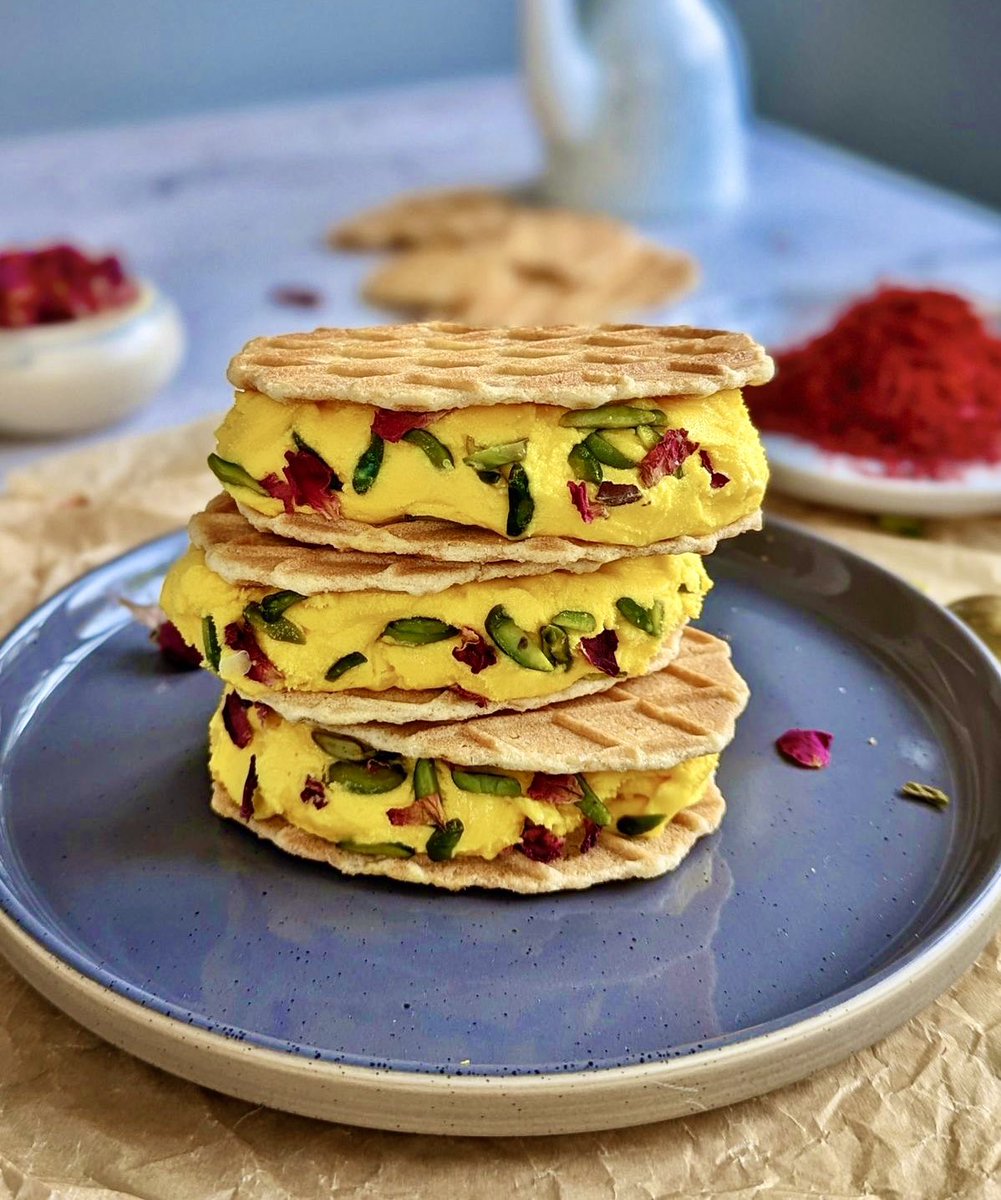
9/ Kulfi
Originated in the Indian subcontinent during the Mughal era, 16th century. Popular in Myanmar, Nepal, Sri Lanka the Middle East, Central Asia & part of the national cuisines of India, Pakistan & Bangladesh. Kulfi is denser & creamier than ice cream #IceCreamDay
Originated in the Indian subcontinent during the Mughal era, 16th century. Popular in Myanmar, Nepal, Sri Lanka the Middle East, Central Asia & part of the national cuisines of India, Pakistan & Bangladesh. Kulfi is denser & creamier than ice cream #IceCreamDay

10/ Gahwa Ice Cream
Gahwa is Arabic coffee. Most Arab countries throughout the Middle East have developed distinct methods for brewing and preparing coffee. Cardamom is an often-added spice to Gahwa and their are variations of this ice cream including date & Gahwa #IceCreamDay
Gahwa is Arabic coffee. Most Arab countries throughout the Middle East have developed distinct methods for brewing and preparing coffee. Cardamom is an often-added spice to Gahwa and their are variations of this ice cream including date & Gahwa #IceCreamDay

11/ Bouza Ala Haleeb, Lebanon
It is made with Ashta and mastic gum add pistachios to this combination and you are up for a feast in your mouth. Lebanese ice cream is called Booza or Buzza and sometimes it is referred to as Arabic ice cream #IceCreamDay
It is made with Ashta and mastic gum add pistachios to this combination and you are up for a feast in your mouth. Lebanese ice cream is called Booza or Buzza and sometimes it is referred to as Arabic ice cream #IceCreamDay

12/ Camel Milk Ice Cream
Camel milk ice cream doesn't look any different from traditional ice cream. It has the same enticing creamy texture and is made the same way -- rendered with 50% more air after the initial churning process #IceCreamDay
Camel milk ice cream doesn't look any different from traditional ice cream. It has the same enticing creamy texture and is made the same way -- rendered with 50% more air after the initial churning process #IceCreamDay

13/ Baklava Ice Cream
This modern twist on the traditional dessert involves lots of honey and pistachio nuts, with a cinnamon swirl, along with orange blossom water (rose water works as well) to give it that Middle Eastern flavor so often associated with baklava #IceCreamDay
This modern twist on the traditional dessert involves lots of honey and pistachio nuts, with a cinnamon swirl, along with orange blossom water (rose water works as well) to give it that Middle Eastern flavor so often associated with baklava #IceCreamDay
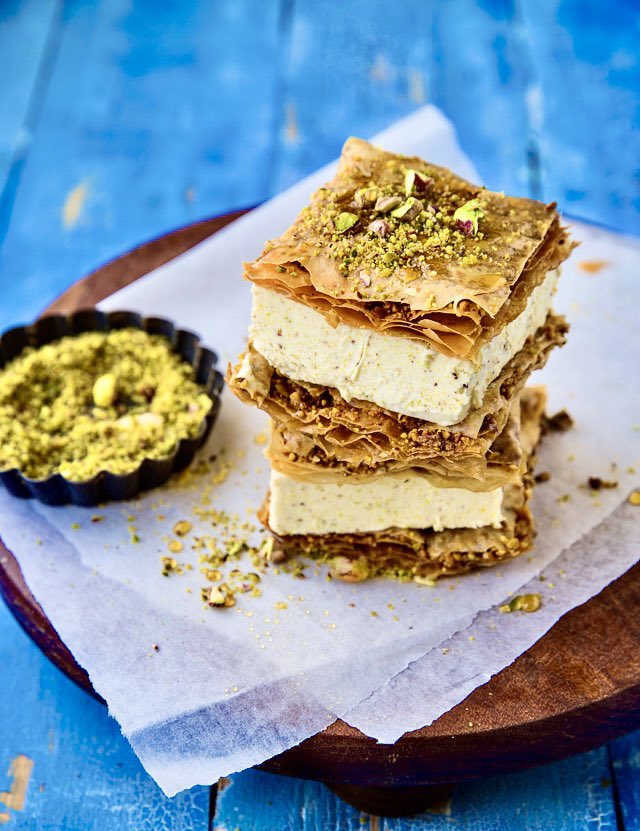
14/ Créponné, Algeria
Creponne is a traditional Algerian lemon sorbet that originates from Oran, Algeria. This Algerian specialty is white coloured and has an unforgettable taste. A tasty icy sweet treat #IceCreamDay
Creponne is a traditional Algerian lemon sorbet that originates from Oran, Algeria. This Algerian specialty is white coloured and has an unforgettable taste. A tasty icy sweet treat #IceCreamDay

15/ Konafa Cones & Eshta Ice Cream
The classic cream konafa just got ice cream-ized! Crunchy, sweetened konafa cones scooped with orange blossom water scented eshta ice cream! A new craze - this is an Egyptian’s answer to the latest crazy ice cream cone trend #IceCreamDay
The classic cream konafa just got ice cream-ized! Crunchy, sweetened konafa cones scooped with orange blossom water scented eshta ice cream! A new craze - this is an Egyptian’s answer to the latest crazy ice cream cone trend #IceCreamDay

16/ Mango kulfi
A frozen summer dessert made with milk, sugar & sweet ripe mangoes.The milk is cooked very slowly with constant stirring so it does not stick & is reduced by half. This caramelizes the lactose and sugar, giving kulfi a distinct flavour #IceCreamDay
A frozen summer dessert made with milk, sugar & sweet ripe mangoes.The milk is cooked very slowly with constant stirring so it does not stick & is reduced by half. This caramelizes the lactose and sugar, giving kulfi a distinct flavour #IceCreamDay

17/ Sheeryakh, Afghanistan
Sheeryakh means frozen milk or even milk in Dari language. Ingredients include cardamom, rose water, and vanilla, served in small bowls the ice cream is topped with pistachios, thick cream, and even almonds #IceCreamDay
Sheeryakh means frozen milk or even milk in Dari language. Ingredients include cardamom, rose water, and vanilla, served in small bowls the ice cream is topped with pistachios, thick cream, and even almonds #IceCreamDay

18/ Kunafa Sundae
A take on the traditional Middle Eastern Kunafa. The Kunafa Sundae is a combination of vanilla flavoured Kulfi ice cream, which is topped with a layer of roasted semolina used for the kunafa. Garnished with roasted pistachios & even pistachio sauce #IceCreamDay
A take on the traditional Middle Eastern Kunafa. The Kunafa Sundae is a combination of vanilla flavoured Kulfi ice cream, which is topped with a layer of roasted semolina used for the kunafa. Garnished with roasted pistachios & even pistachio sauce #IceCreamDay

19/ Egyptian Booza Ice Cream
Egyptian Booza ice cream is thick and elastic. It consists mainly of milk, cream, salep, mastic gum and sugar. The combination of these ingredients produces a rich creamy taste and a gummy texture #IceCreamDay
Egyptian Booza ice cream is thick and elastic. It consists mainly of milk, cream, salep, mastic gum and sugar. The combination of these ingredients produces a rich creamy taste and a gummy texture #IceCreamDay

20/ Moroccan Mint Ice Cream
Travel to Morocco and you you will be greeted with Moroccan mint tea. This flavour is a twist on the traditional ice cream #IceCreamDay
Travel to Morocco and you you will be greeted with Moroccan mint tea. This flavour is a twist on the traditional ice cream #IceCreamDay

21/ Dondurma/Darduma, Sudan
Okay this is not an ice cream, but definitely an icey sweet treat! Dondurma/Darduma is a popular type of flavored Ice Popsicles in a bag, often homemade and a classic Sudanese favourite #IceCreamDay
Okay this is not an ice cream, but definitely an icey sweet treat! Dondurma/Darduma is a popular type of flavored Ice Popsicles in a bag, often homemade and a classic Sudanese favourite #IceCreamDay

22/ Pistachio Ice Cream
Popular in the Middle East, Central Asia & South Asia, Pistachio ice cream or pistachio nut ice cream is an ice cream flavor made with pistachio nuts or flavoring. It is often distinctively green in colour #IceCreamDay
Popular in the Middle East, Central Asia & South Asia, Pistachio ice cream or pistachio nut ice cream is an ice cream flavor made with pistachio nuts or flavoring. It is often distinctively green in colour #IceCreamDay

23/ Buza ‘Ala-Tamr
Before sugar became commonly available, dates were used as a sweetener in Arabia. Although date ice cream is a recent addition to the Arabian culinary repertoire, it makes use of dates as the main sweetener just as they did at the advent of Islam #IceCreamDay
Before sugar became commonly available, dates were used as a sweetener in Arabia. Although date ice cream is a recent addition to the Arabian culinary repertoire, it makes use of dates as the main sweetener just as they did at the advent of Islam #IceCreamDay

24/ Frozen Yogurt
Long before it became one of the most popular frozen desserts of the 21st century, Frozen Yogurt can trace its roots back more than 5,000 years with origins in both the Middle East & India. Considered a healthy alternative to ice cream #IceCreamDay
Long before it became one of the most popular frozen desserts of the 21st century, Frozen Yogurt can trace its roots back more than 5,000 years with origins in both the Middle East & India. Considered a healthy alternative to ice cream #IceCreamDay
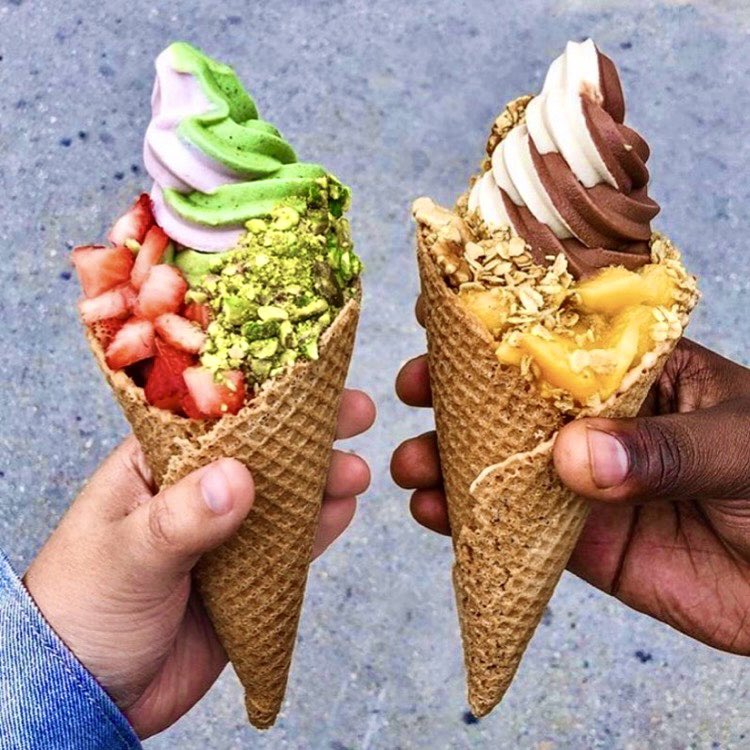
25/ Gulkand Ice Cream
This rose ice cream is one of the most beloved ice cream recipes in India during the summer. This rose petal ice cream is a favourite during these hot sunny days. It’s soft, creamy, refreshing, flavoured, luscious and perfect to quench the heat #IceCreamDay
This rose ice cream is one of the most beloved ice cream recipes in India during the summer. This rose petal ice cream is a favourite during these hot sunny days. It’s soft, creamy, refreshing, flavoured, luscious and perfect to quench the heat #IceCreamDay
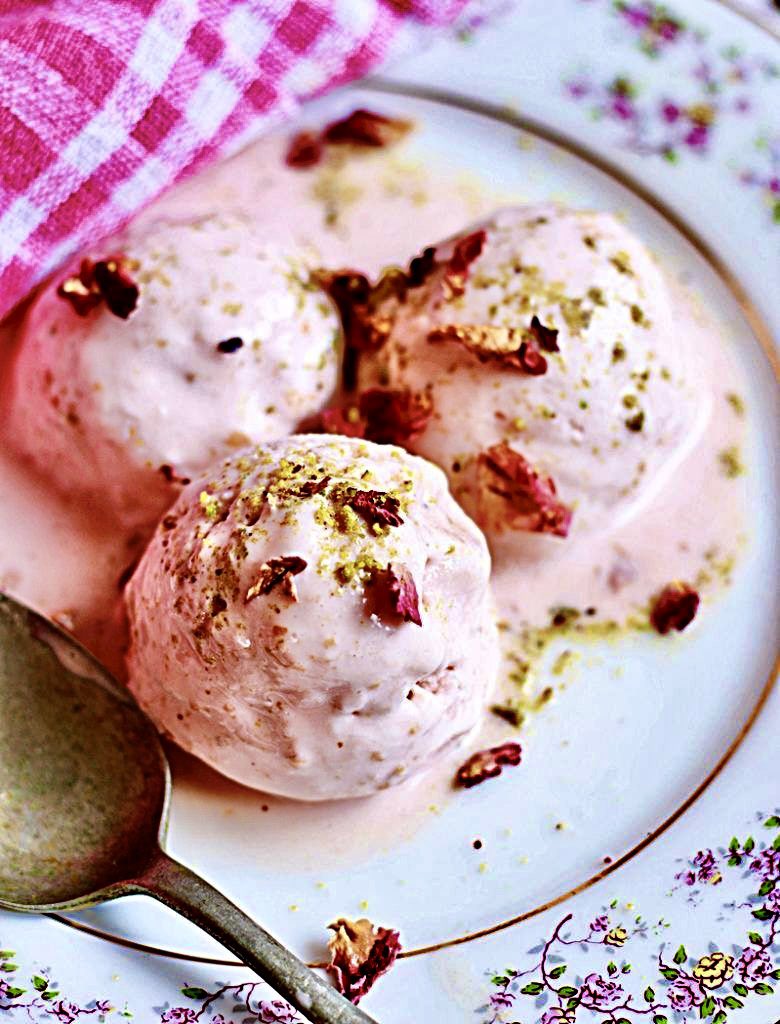
For #WorldIceCreamDay discover more about Ice Cream in Muslim Cultures...
baytalfann.com/post/ice-cream…
baytalfann.com/post/ice-cream…
• • •
Missing some Tweet in this thread? You can try to
force a refresh





